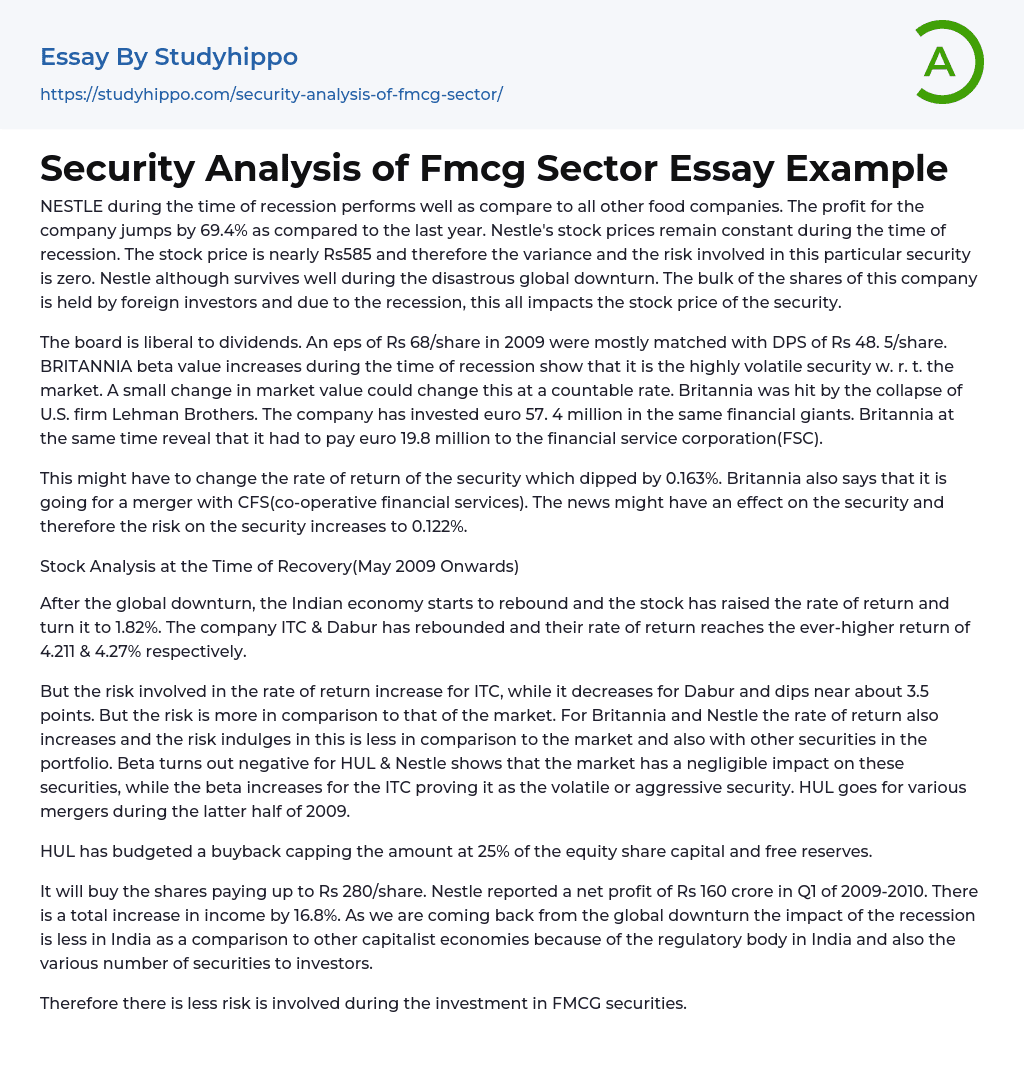NESTLE during the time of recession performs well as compare to all other food companies. The profit for the company jumps by 69.4% as compared to the last year. Nestle's stock prices remain constant during the time of recession. The stock price is nearly Rs585 and therefore the variance and the risk involved in this particular security is zero. Nestle although survives well during the disastrous global downturn. The bulk of the shares of this company is held by foreign investors and due to the recession, this all impacts the stock price of the security.
The board is liberal to dividends. An eps of Rs 68/share in 2009 were mostly matched with DPS of Rs 48. 5/share. BRITANNIA beta value increases during the time of recession show that it is the highly volatile security w. r. t. the market. A small
...change in market value could change this at a countable rate. Britannia was hit by the collapse of U.S. firm Lehman Brothers. The company has invested euro 57. 4 million in the same financial giants. Britannia at the same time reveal that it had to pay euro 19.8 million to the financial service corporation(FSC).
This might have to change the rate of return of the security which dipped by 0.163%. Britannia also says that it is going for a merger with CFS(co-operative financial services). The news might have an effect on the security and therefore the risk on the security increases to 0.122%.
Stock Analysis at the Time of Recovery(May 2009 Onwards)
After the global downturn, the Indian economy starts to rebound and the stock has raised the rate of return and turn it to 1.82%. The compan
ITC & Dabur has rebounded and their rate of return reaches the ever-higher return of 4.211 & 4.27% respectively.
But the risk involved in the rate of return increase for ITC, while it decreases for Dabur and dips near about 3.5 points. But the risk is more in comparison to that of the market. For Britannia and Nestle the rate of return also increases and the risk indulges in this is less in comparison to the market and also with other securities in the portfolio. Beta turns out negative for HUL & Nestle shows that the market has a negligible impact on these securities, while the beta increases for the ITC proving it as the volatile or aggressive security. HUL goes for various mergers during the latter half of 2009.
HUL has budgeted a buyback capping the amount at 25% of the equity share capital and free reserves.
It will buy the shares paying up to Rs 280/share. Nestle reported a net profit of Rs 160 crore in Q1 of 2009-2010. There is a total increase in income by 16.8%. As we are coming back from the global downturn the impact of the recession is less in India as a comparison to other capitalist economies because of the regulatory body in India and also the various number of securities to investors.
Therefore there is less risk is involved during the investment in FMCG securities.
- Internet Privacy essays
- Cyber Security essays
- Funding essays
- Hedge Fund essays
- Payment essays
- Rate Of Return essays
- American Dream essays
- Barriers To Entry essays
- Capitalism essays
- Central Bank essays
- Compensation essays
- Consumerism essays
- Economic Development essays
- Economic Growth essays
- Economic Inequality essays
- Economic System essays
- Economy essays
- Employment essays
- Export essays
- Finance essays
- Free Trade essays
- Gross Domestic Product essays
- Human Development essays
- Income Inequality essays
- Industry essays
- Inflation essays
- International Business essays
- International Trade essays
- Macroeconomics essays
- Materialism essays
- Max Weber essays
- Microeconomics essays
- Minimum Wage essays
- Monetary Policy essays
- Monopoly essays
- Pricing essays
- Profit essays
- Recession essays
- resources essays
- Taxation essays
- Trade essays
- Unemployment essays
- Warehouse essays
- World economy essays
- Agreement essays
- Business Law essays
- Common Law essays
- Community Policing essays
- Constitution essays
- Consumer Protection essays




